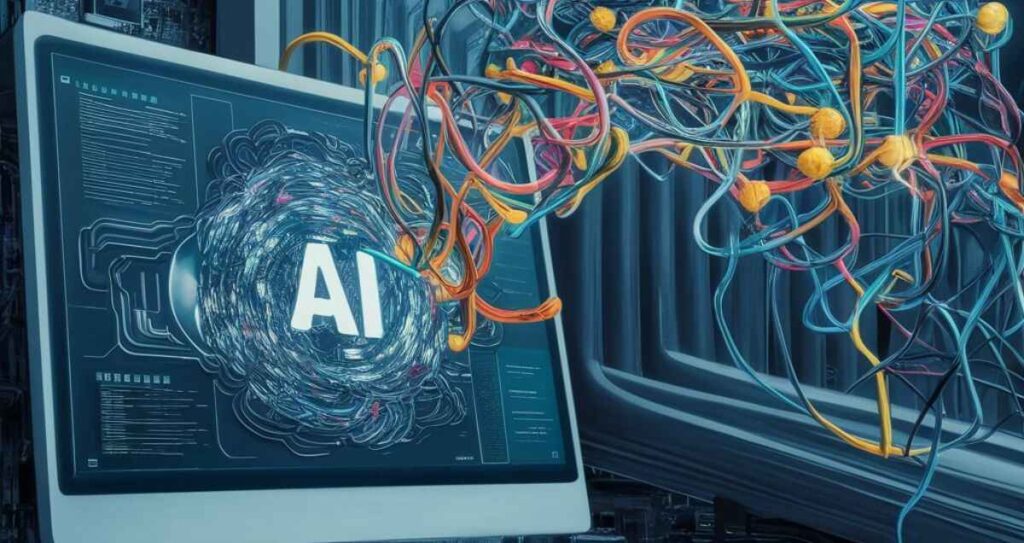What Is Artificial Intelligence In Computer? refers to the simulation of human intelligence by machines, enabling them to learn, reason, and perform tasks autonomously.
Imagine a world where computers not only perform tasks but also learn and adapt like humans. Artificial intelligence in computers is making this vision a reality.
What Is Artificial Intelligence In Computer? combines advanced algorithms and vast data sets to mimic human cognition. From enhancing decision-making to automating mundane tasks, AI transforms various industries. As technology evolves, its applications will expand, bringing new efficiencies and innovations.
Key Components of Artificial Intelligence in Computers

To better understand What Is Artificial Intelligence In Computer? systems, let’s break down the main components that make AI possible:
- Machine Learning (ML): A subset of AI where computers learn from data and improve their performance over time without explicit programming. It’s used in applications like recommendation systems and predictive analytics.
- Neural Networks: Algorithms inspired by the human brain, used to model complex patterns and make decisions based on data inputs. Neural networks are essential in deep learning.
- Natural Language Processing (NLP): The ability of computers to understand, interpret, and respond to human language. AI chatbots and virtual assistants use NLP to communicate with users.
- Computer Vision: The field that allows computers to “see” and interpret visual data like images and videos, enabling applications such as facial recognition.
How Artificial Intelligence in Computers Works
AI in computer systems relies on algorithms and large data sets to process information, make decisions, and adapt. The AI systems are trained on vast amounts of data, learning patterns that allow them to predict outcomes or recognize specific objects or tasks. Once trained, the AI models can work autonomously or assist humans in decision-making processes.
The process typically follows these steps:
- Data Collection: AI models require significant amounts of data to function. This data can come from various sources such as databases, sensors, or user input.
- Data Processing: After collecting data, the AI system processes it, removing any irrelevant or redundant information. This step ensures the model works with accurate and high-quality data.
- Model Training: Using algorithms like neural networks, the system learns from the data, identifying patterns and trends. Training might require numerous iterations for the model to improve accuracy.
- Decision-Making: Once trained, the AI model can make predictions or decisions based on the input data, whether it’s determining what products a customer might like or diagnosing diseases from medical scans.
- Continuous Learning: AI models don’t stop after initial training. They continue to learn and improve over time as they receive new data.
Applications of Artificial Intelligence in Computers
Artificial intelligence in computers has permeated numerous industries, making everyday tasks smarter and more efficient. Below are some key areas where AI in computer systems is being applied:
Healthcare
In healthcare, AI has helped revolutionize diagnostics and treatment planning. AI algorithms can analyze patient data, medical images, and genetic information to assist doctors in diagnosing diseases faster and more accurately than ever before.
- AI in Medical Imaging: AI systems can analyze radiology images, detect abnormalities like tumors or fractures, and even suggest treatment options. This reduces human error and enhances diagnostic accuracy.
- Predictive Analytics: AI models predict patient outcomes based on data from electronic health records (EHRs), enabling personalized treatment plans.
Finance
AI has also disrupted the finance industry, especially in fraud detection, risk management, and automated trading.
- Fraud Detection: Machine learning models help banks detect fraudulent activities by identifying unusual patterns in transactions.
- Robo-Advisors: AI-driven systems offer automated financial advice to customers, helping them make informed investment decisions without the need for human advisors.
Retail
In retail, artificial intelligence in computers helps businesses improve customer service, optimize supply chains, and create personalized shopping experiences.
- Recommendation Engines: AI recommends products based on previous purchases and browsing behavior, increasing sales and customer satisfaction.
- Inventory Management: AI-powered systems can predict demand trends, helping retailers avoid stockouts or overstock situations.
Advantages of Artificial Intelligence in Computers

AI’s adoption across various sectors offers numerous advantages, many of which stem from its ability to process vast amounts of data quickly and accurately. Below are some of the key benefits:
| Benefit | Description |
|---|---|
| Increased Efficiency | AI systems can automate repetitive tasks, freeing up time for human workers to focus on more complex issues. |
| Reduced Errors | AI models can process data and perform tasks with far fewer mistakes than humans, improving accuracy. |
| Cost Savings | By automating processes, companies save on labor costs and reduce operational expenses. |
| Enhanced Decision-Making | AI systems analyze data faster than humans, helping organizations make more informed decisions. |
| Scalability | AI-driven systems can scale easily, processing more data or tasks without requiring additional resources. |
Challenges and Ethical Considerations
While artificial intelligence in computer systems offers numerous benefits, it also presents some significant challenges and ethical concerns:
Bias in AI Algorithms
One major issue is bias in AI systems. Since AI models learn from historical data, they can unintentionally perpetuate existing biases present in that data. For example, an AI system used in hiring could favor certain demographics if the training data contains biased patterns.
Job Displacement
As AI automates more tasks, concerns about job displacement are rising. Although AI can handle many repetitive tasks, this may lead to a reduction in demand for certain types of labor, particularly in industries like manufacturing and data entry.
Data Privacy
AI relies heavily on large amounts of data to function effectively, raising questions about how this data is collected, stored, and used. The potential for misuse or breaches of personal information is a significant ethical concern.
Future Trends in Artificial Intelligence in Computers
The future of What Is Artificial Intelligence In Computer? systems is filled with possibilities. Advances in quantum computing, autonomous systems, and more sophisticated machine learning models are poised to further transform the tech landscape. Below are some emerging trends to watch:
- AI and Quantum Computing: Quantum computers, which perform computations at unprecedented speeds, could make AI algorithms even more powerful, solving complex problems that current systems can’t handle.
- Autonomous Vehicles: AI will continue to be the driving force behind the development of self-driving cars, improving road safety and reducing traffic congestion.
- AI in Cybersecurity: As cyberattacks become more sophisticated, AI will play a critical role in identifying threats and preventing breaches in real-time.
Conclusion
Artificial intelligence in computer systems is not just a technological trend—it’s a powerful tool that’s shaping the future of multiple industries. From healthcare to finance, AI improves efficiency, reduces errors, and drives innovation. Understanding What Is Artificial Intelligence In Computer? is key to staying ahead in today’s tech-driven world.
As AI continues to evolve, businesses and individuals alike must adapt, leveraging its capabilities while navigating the ethical challenges it presents.
David Mark is a tech and science enthusiast and the writer behind TechNsparks. With a passion for innovation and discovery, David explores the latest advancements in technology and scientific research. His articles provide insightful analysis and engaging commentary, helping readers stay informed about cutting-edge developments. Through TechNsparks, David aims to make complex tech and science topics accessible and exciting for everyone.
